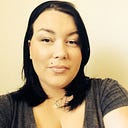How Radical Vulnerability is Key in Loving the “Shadow Self”

I’m a weirdo. I make people uncomfortable. I have a hard time looking at people in the eyes when I talk to them, and I don’t know what emotions are supposed to look or sound like. I don’t have Autism or Aspergers. I have a lifetime of abuse, trauma and torture behind me that have made it hard for me to be present with emotion- either mine or someone else’s. So many people have told me I have a “flat affect” and my reaction is basically — ”ummm yeah, cause in the life I’ve lived it wasn’t safe to sit with emotion. That is a privilege not afforded everyone.”
Psychologist Carl Jung defines “the shadow self” as an unconscious aspect of the personality that the ego does not identify with. These are parts of ourselves that are either socially frowned upon, stigmatized, made illegal or regarded as immoral. basically these are the parts of ourselves- no less real than the parts society does approve of- that we shun and do not acknowledge.
For so long now I have hated the parts of myself that I knew made me different. I would hide all the things that I considered “other.” This included the fact that I am an incest survivor because it grosses people out, or that I’m in recovery for drugs and alcohol, have been in and out of psychiatric hospitals for my whole life, have Bipolar and sometimes go into clinical psychosis, that I’m a rape survivor, domestic violence survivor, sex trafficking survivor, that I’ve been a hooker for drugs, gotten gang banged for $30 cause I was that poor, that I never made a lot of money as a sex worker, that I go to the food bank, I’m on the verge of eviction etc,…I spent so much time denying that these things are part of my story. I would try to pretend that I was “normal”- that I had two parents who loved and supported me and that life had been great to me and I was so normal and well adjusted. But fuck that. That is NOT my story. And while all the painful things that have happened to me do not define me, they do inform me. And to deny that is just doing a disservice to myself. My “shadow” experiences have only added to my testimony and helped leverage me to the place I need to be in life- a writer and activist for marginalized folks like myself. I’m not one of those “normal” people who had loving parents and a carefree childhood, who work at Google for six figures and pay all their bills on time. But that could never be my life anyway. That isn’t me and that isn’t where my story was supposed to take me. It was supposed to take me here- right now- to this moment, writing about this very subject.
It’s hard to be okay with the parts of ourselves that we know society does not find attractive or desirable. I still get flustered when I get around someone who appears to have it so much more “together” than me. I feel shame. Shame that I’m not enough. My answer has been a kind of very raw vulnerability- the kind many people can’t handle because it makes them uncomfortable and challenges them on their prejudices. Like Brené Brown says, vulnerability is the only thing that can challenge deep shame. Vulnerability has been the single most terrifying concept to me throughout my life. I was taught that vulnerability equals annihilation, because people cannot be trusted to hold space for that vulnerability with respect.
It’s ok not to fit in, not to be able to relate to certain people. Those aren’t your people. As poet Rune Lazuli once said, “your purpose is hidden in your wounds.” And my life is living proof of exactly that.
“You either walk inside your story and own it, or you stand outside your story and hustle for your worthiness.”
-Brené Brown
